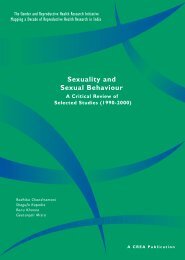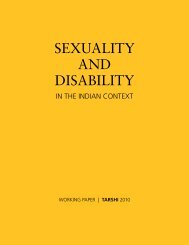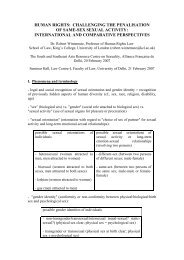People with Disabilities in India: From Commitment to Outcomes
People with Disabilities in India: From Commitment to Outcomes
People with Disabilities in India: From Commitment to Outcomes
Create successful ePaper yourself
Turn your PDF publications into a flip-book with our unique Google optimized e-Paper software.
7.8 (ii) Sec<strong>to</strong>ral policy issues <strong>in</strong> the Act: There are also several sec<strong>to</strong>r-specific policy<br />
issues worth not<strong>in</strong>g. They <strong>in</strong>clude:<br />
• Employment: With respect <strong>to</strong> public sec<strong>to</strong>r employment, the Act provides for 3 percent<br />
of “identified posts” <strong>to</strong> be filled by PWD. The current list of posts (identified only <strong>in</strong> 2001) is<br />
restrictive, arbitrary and based purely on impairment, <strong>with</strong>out consideration of personal or<br />
environmental fac<strong>to</strong>rs. There are also no sanctions for non-compliance. This is discussed<br />
further <strong>in</strong> Chapter 6. The overall approach is one that is not considered good practice<br />
<strong>in</strong>ternationally, even <strong>in</strong> systems where a quota approach is used. A second feature of the<br />
quota policy is that it applies only <strong>to</strong> three disability types – locomo<strong>to</strong>r, visual and hear<strong>in</strong>g,<br />
<strong>with</strong> a 1 percent reservation for each. Thus even the full disability categories of the Act are<br />
not <strong>in</strong>cluded <strong>in</strong> the reservation policy.<br />
• Education: While the thrust of the Act <strong>to</strong> ensure that CWD are <strong>in</strong> school is clear,<br />
its guidance on the most appropriate type of education and who should take the decisions<br />
on that issue is less so. The Act provides that education of CWD should be <strong>in</strong> “an<br />
appropriate environment”. However, it has a multiple track of promot<strong>in</strong>g <strong>in</strong>tegration of CWD<br />
<strong>in</strong><strong>to</strong> regular schools, sett<strong>in</strong>g up of special schools, and home-based education. While the<br />
different approaches need not be contradic<strong>to</strong>ry, the Act provides limited guidance both on<br />
which approach should be considered preferable and on who is <strong>to</strong> take and enforce decisions<br />
on what is considered an appropriate educational environment for <strong>in</strong>dividual children.<br />
Subsequent policies have provided some more guidance on the issue, but whether it rema<strong>in</strong>s<br />
the right of parents where <strong>to</strong> school their children is unclear.<br />
• Health: Apart from be<strong>in</strong>g subject <strong>to</strong> the economic capacity proviso, the provisions of the<br />
Act <strong>in</strong> the area of health are very limited. Perhaps the most notable po<strong>in</strong>t is that the<br />
obligations of the authorities are so generally phrased that they are difficult <strong>to</strong> <strong>in</strong>terpret <strong>in</strong><br />
terms of enforcement. Thus, the authorities should pursue “various methods for prevent<strong>in</strong>g<br />
disabilities”, “take measures” for promot<strong>in</strong>g pre-, peri- and post-natal care, and “create<br />
awareness” of disability issues. The comb<strong>in</strong>ation of the economic capacity proviso and<br />
such general language makes it difficult <strong>to</strong> consider the provisions on prevention and early<br />
detection of disabilities as more than statements of <strong>in</strong>tent. The fact that the subsequent<br />
jurisprudence on health issues relates almost entirely <strong>to</strong> issues of cus<strong>to</strong>dial treatment of<br />
mental health patients and their capacity <strong>in</strong> personal law seems <strong>to</strong> support this conclusion.<br />
7.9 As of 2006, the M<strong>in</strong>istry has proposed a number of amendments <strong>to</strong> the PWD Act which<br />
are under consultation. The general areas for proposed revision are:<br />
• revision of def<strong>in</strong>itions of a number of disabilities, <strong>in</strong>clud<strong>in</strong>g mental illness, cerebral<br />
palsy, low vision, mental retardation and other impairments. For several of the<br />
conditions, a positive element of the proposals is that they take <strong>in</strong><strong>to</strong> account more<br />
explicitly the impacts of impairments on functions and activities of daily liv<strong>in</strong>g. On the<br />
other hand, there is a question as <strong>to</strong> whether the Act itself is the most appropriate place<br />
for precise medical and other def<strong>in</strong>itions of disabilities, or whether the implement<strong>in</strong>g<br />
Rules may give more flexibility <strong>in</strong> adjust<strong>in</strong>g def<strong>in</strong>itions over time.<br />
• revised provisions on the <strong>in</strong>stitutions responsible for various areas of implementation<br />
and oversight of the Act. Some of this is (appropriately) mov<strong>in</strong>g precise def<strong>in</strong>ition of<br />
<strong>in</strong>stitutional composition and other details <strong>in</strong><strong>to</strong> the implement<strong>in</strong>g Rules. Others make the<br />
mandate of bodies such as the central Coord<strong>in</strong>ation Committee more general and<br />
overarch<strong>in</strong>g <strong>in</strong> nature.<br />
-126-










